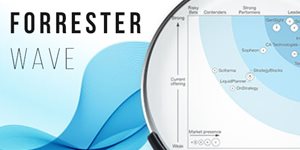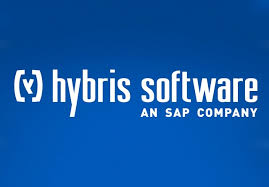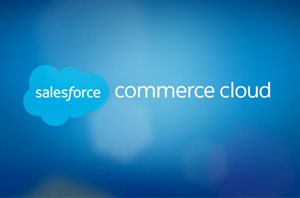Forrester Evaluates Top B2C Commerce Suites
Forrester published The Forrester Wave: B2C Commerce Suites, Q1 2017. Of the 13 platforms  Forrester evaluated for the B2C Commerce Suites report, SAP Hybris and Salesforce lead the pack; Digital River, IBM, Intershop, Magento, and Oracle Commerce Cloud have been named as “strong performers”; commercetools, Elastic Path, Episerver, Kibo, Oracle-NetSuite, and Sitecore are "Contenders". According to Forrester, legacy commerce technology is becoming outdated and less effective. Therefore, vendors that have the capabilities to speed up time-to-market (TTM) and support analytics, experience management, and omnichannel will leapfrog the cut-throat competition.
Forrester evaluated for the B2C Commerce Suites report, SAP Hybris and Salesforce lead the pack; Digital River, IBM, Intershop, Magento, and Oracle Commerce Cloud have been named as “strong performers”; commercetools, Elastic Path, Episerver, Kibo, Oracle-NetSuite, and Sitecore are "Contenders". According to Forrester, legacy commerce technology is becoming outdated and less effective. Therefore, vendors that have the capabilities to speed up time-to-market (TTM) and support analytics, experience management, and omnichannel will leapfrog the cut-throat competition.
In the report, Forrester didn’t only evaluate the B2C commerce platforms but also retailers’ demand for commerce suites. Before diving into the categories and how vendors have been performing, let’s take a moment to discuss the expectations that merchandisers and branded manufacturers have from commerce suite vendors to protect their market share from Amazon.
According to Forrester analysts, digital businesses are no longer looking for basic capabilities such as running an online catalogue, shopping cart, and promotions when they evaluate platforms. Businesses are on the lookout for more sophisticated B2C commerce technology that can deliver an intuitive back-end user experience in line with a seamless front-end user experience. It is hard to disagree with the authors because, with ever-changing technology trends, businesses need to maximize their technology investments. To be able to do so, they expect vendors to enable them to build a solution that is flexible and expandable over time. In the report, Forrester specifically cited these following four capabilities that B2C commerce technology should support:
-
Omnichannel engagement
-
Personalized digital commerce experiences
-
Data-driven merchant tools
-
Agility and faster time-to-market
Three Models of B2C Commerce Suites
In the report, Forrester also weighs in on three primary models of suites that digital businesses purchase.
All-in-one commerce suite approach: With these type of platforms, users can connect every step of a multichannel, multi-location business while all the capabilities from e-commerce, POS and order management to merchandising, marketing, inventory, financials and customer service are offered in one. Forrester recommends this approach for those digital businesses which are midmarket and lower enterprise firms that can’t afford to integrate multiple best-of-breed components, and for firms in the beginning stages of developing their digital commerce business.
Commerce suite with complementary best-of-breed solutions: Though this approach is not as common as an all-in-one commerce suite, some digital businesses prefer to invest in best-of-breed software for every single capability and integrate them with each other. Due to the integration cost, time, and the need for different expertise, it is no wonder why this approach hasn’t been adopted very well. However, there are some cases where this approach works perfectly especially for enterprise-level businesses. For instance, an organization might be satisfied with all of the capabilities their suite offers but for a particular capability they might prefer to utilize a best-of-breed system.
Headless commerce suite: “Headless commerce” is one of today's hottest topics and a newer approach in the space. With this approach, the digital commerce platform is decomposed into a set of programmable interfaces that make shopping features embeddable into images, videos, banners and other digital experiences. Therefore, it is recommended for users who are typically either heavily invested in existing web CMS and marketing toolsets or want to monetize social content by injecting the buying opportunities through a set of application programming interfaces (APIs).
Inclusion Criteria
Forrester stated that they have the same amount of criteria with the B2B Forrester Wave evaluation that they had for the B2C Forrester Wave. However, each report focuses on some different areas. In this report, for instance, experience management, digital store, and omnichannel had more weight than B2B-specific areas like eProcurement, full-spectrum selling, and channel management. Here are the vendor inclusion criteria:
-
The vendor illustrates a strong focus on B2C Commerce.
-
The vendor possesses critical components of a standalone B2C commerce suite.
-
The vendor has sizable revenue and a large overall customer base.
-
The vendor has significant mindshare, focus, and existing base with global, enterprise customers.
Leaders: SAP Hybris and Salesforce
SAP Hybris
Since the previous Wave in this category was published in 2015, the vendor has doubled  down on investments in marketing and experience management capabilities. One of the reasons why SAP Hybris is always in most consideration sets for commerce technology selections is its scalability. You can wire and configure both new and existing components with the Java Spring Framework, from there add your own business objects and processes. Implementations in production support more than 20 million SKUs and 6,000 transactions per second. The platform is one of the best suited for on-premise large-scale highly customized multi-channel operations as it is capable of tackling the majority large scale enterprise e-commerce use-cases. Another reason is that the Hybris Omni Commerce Connect (OCC) web services offer a RESTful web services API to make the platform service-oriented.
down on investments in marketing and experience management capabilities. One of the reasons why SAP Hybris is always in most consideration sets for commerce technology selections is its scalability. You can wire and configure both new and existing components with the Java Spring Framework, from there add your own business objects and processes. Implementations in production support more than 20 million SKUs and 6,000 transactions per second. The platform is one of the best suited for on-premise large-scale highly customized multi-channel operations as it is capable of tackling the majority large scale enterprise e-commerce use-cases. Another reason is that the Hybris Omni Commerce Connect (OCC) web services offer a RESTful web services API to make the platform service-oriented.
Thanks to SAP Hybris Customer Experience, the platform enables retailers to provide contextual experiences to their customers with its integrated, intelligent and automated content management solution. However, every rose has its thorn so Hybris implementations are neither fast nor inexpensive. The projects are completed anywhere from 12-24 months. For a standard large-size business implementation, SAP Hybris merchants spend around $50,000 per year.
In the report, Forrester recommends the platform for companies looking for an industrial-strength, reliable, and fully functional commerce platform that is in wide use across several industry verticals.
Salesforce
Launched in 2004, Demandware is a cloud-based e-commerce platform and uses a subscription model that is based on revenue sharing. Demandware was acquired by Salesforce  for $2.8 billion in cash which marked the largest deal in Salesforce M&A history. After the acquisition, Salesforce rebranded it as the Commerce Cloud (CC).
for $2.8 billion in cash which marked the largest deal in Salesforce M&A history. After the acquisition, Salesforce rebranded it as the Commerce Cloud (CC).
The Commerce Cloud is a SaaS solution providing a solid infrastructure, the platform is very scalable and tuned for high performance, as long as users follow common sense architecture. It provides optimal speed even at peak traffic times. Additionally, in case the site crashes due to high traffic, built-in redundancies and disaster recovery solutions are available in the system. For those who just want to get a simple storefront up and running, this initiative could become overwhelming as there is also a learning curve to be able to tackle it successfully. However, according to Forrester, Salesforce is the best fit for retailers looking for a strong, highly scalable, cloud-based commerce platform.
Strong Performers
In the report, Digital River, IBM, Intershop, Magento, and Oracle Commerce Cloud have been named as Strong Performers. The report provides thorough information for each platform and vendor, I would like to share what stuck out the most for me. Here are some highlights:
-
There are some concerns about the upgrade process from Magento 1 to Magento 2.
-
Forrester recommends Magento 2 for companies that prefer open source, and enterprises looking for an affordable alternative to traditional enterprise software solutions.
-
Forrester believes that IBM needs to improve its features in experience management areas such as web CMS and the integration between its proprietary commerce and marketing tools.
-
According to Forrester’s clients’ feedback, Oracle Commerce Cloud (OCC) is “impressively stable” and “easy to get up and running with,” but they also cite “functionality limitations” and some feature deficiencies relative to the on-premises solution.
-
Forrester recommends Intershop for brand manufacturers that have complex channel support requirements, need especially well-developed commerce feature functionality, and are looking for flexibility on global pricing and licensing.
-
Even though it is not capable of managing a brand-heavy commerce experience, Digital River has been ranked high for its SaaS-based architecture and core eCommerce capabilities. The platform’s differentiators are its globalization capabilities and ability to handle global payments and complex subscriptions, according to Forrester.
In addition to all the vendors mentioned above, Forrester also included commercetools, Elastic Path, Episerver, Kibo, Oracle-NetSuite, and Sitecore to the report by noting that they must continue to evolve their offerings.
My POV
The demand for e-commerce experiences is driving CMS and CRM vendors to adopt stronger, more tightly integrated commerce capabilities. To receive some market share from this unprecedentedly emerging space, many vendors today, are heavily investing in providing very viable e-commerce solutions either through acquisitions and strong partnership or from building the capabilities in-house. After all, as Forrester previously predicted, online retail sales are expected to reach $370 billion this year, and due to emerging end customers’ needs, the market still presents enormous opportunities for nimble and innovative vendors.

Venus Tamturk
Venus is the Media Reporter for CMS-Connected, with one of her tasks to write thorough articles by creating the most up-to-date and engaging content using B2B digital marketing. She enjoys increasing brand equity and conversion through the strategic use of social media channels and integrated media marketing plans.